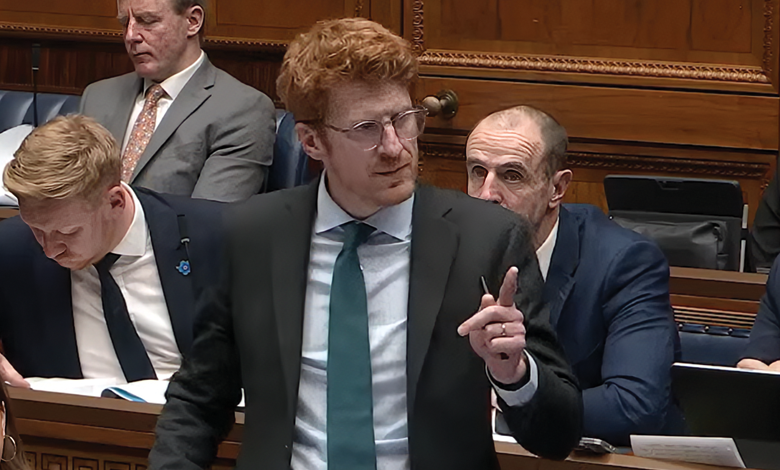Opposition day: A new step for the Assembly

The return of the Assembly allowed a new feature, first outlined in 2016, to be played out as the Northern Ireland Assembly had its first official opposition day on 4 March 2024.
Since the establishment of the Northern Ireland Assembly in its current guise in 1998, the way it operates has been characterised by the often maligned feature of mandatory coalition, which led to all major parties having Executive ministers based on D’Hondt allocation.
On 4 March 2024, the SDLP held the first of its 10 opposition days to which it is entitled to annually. Opposition day grants the party the right to put motions before the Assembly. The SDLP opted to put a motion on reform of the Assembly that would prevent one party collapsing the Executive, along with a commitment from Michelle O’Neill MLA and Emma Little-Pengelly MLA to not remove their parties from the Executive for the rest of the current term.
This motion was defeated, and both the First Minister and deputy First Minister were criticised by Speaker Edwin Poots MLA for their absence from the chamber, in spite of Assembly protocols dictating that, where matters for debate fall within a particular minister’s remit, they must respond.
The Executive parties further combined to defeat an opposition motion calling for the establishment of an ad-hoc committee to move forward institutional reform.
The SDLP, however, did achieve the passage of a motion calling for a resolution to public sector pay disputes before the end of March 2024.
The journey to normalisation
Official opposition is now a feature of the Assembly following the aftermath of the 2016 Assembly election where, in an effort to present their parties as an alternative to their dominant counterparts in the DUP and Sinn Féin, the SDLP and the UUP refused the ministerial roles to which they were entitled in the sixth Assembly, and went into opposition.
This move led to the passage of the Assembly and Executive Reform (Assembly Opposition) Act (Northern Ireland) 2016, which allows a party or parties to form an official opposition if they hold at least 8 per cent of the seats in the Assembly. This legislation followed new standing orders agreed by the Assembly on 14 March 2016.
Where only one party is recognised as the opposition, that party must nominate a member to become Leader of the Opposition. With the SDLP having won eight of the Assembly’s 90 seats in the 2022 election, and with the UUP and Alliance opting to return to the Executive, it now holds the role of the official opposition, granting the party’s nominee Matthew O’Toole MLA the official title ‘Leader of the Opposition’.
Further to the rights outlined within the Standing Orders, the Northern Ireland Assembly website sets out that the Speaker is expected to call on the opposition to speak first or ask a question at times not set out in Standing Orders.
For example, it is expected that the Speaker would call a member of the opposition to speak first after the minister in debates about the budget and Programme for Government, and after the committee chairperson on executive bill debates.
The first opposition day was a new feature in an Assembly context, and opened a new chapter in the history of Stormont, bringing it in line with legislatures across the UK and Ireland.
However, the fact that the leaders of the two main Executive parties were able to break the rules of the Assembly by not attending means that there remains a way to go before the role of official opposition is respected and taken seriously by the Executive parties.
|
Explaining opposition The Leader of the Opposition is entitled to nominate the chair of the Public Accounts Committee, the most powerful committee in the Assembly. The role of opposition may be held by more than one party, and can be done on a coalition basis akin to the Executive it shadows. Where two or more parties form the opposition, the largest party must nominate a member to become Leader of the Opposition and the second largest party must nominate a member to become Deputy Leader of the Opposition. The Standing Orders of the Assembly also set out further rights granted to the official opposition:
|





